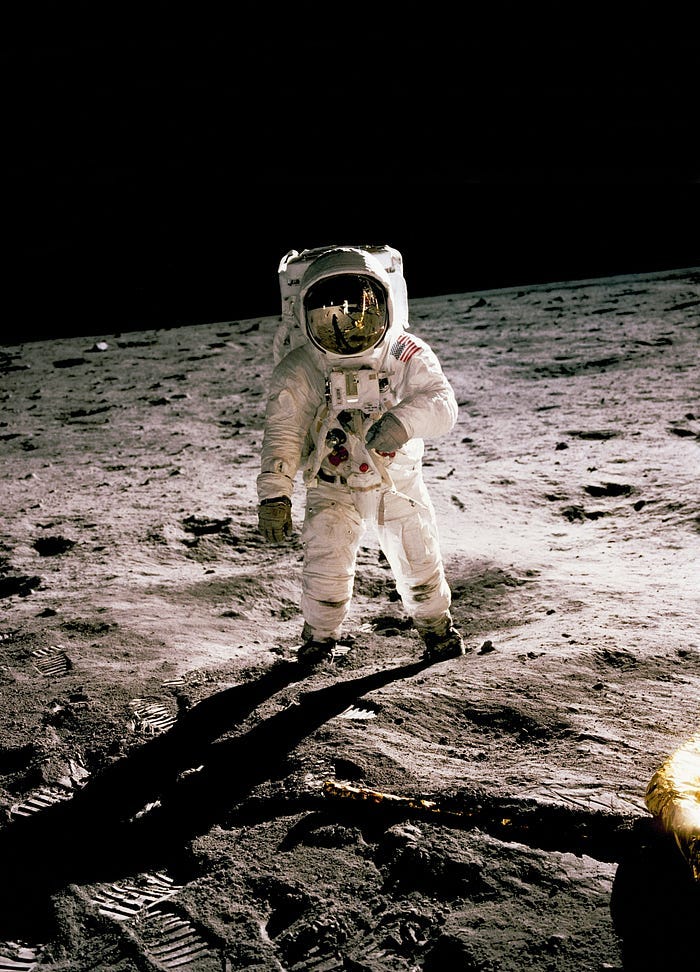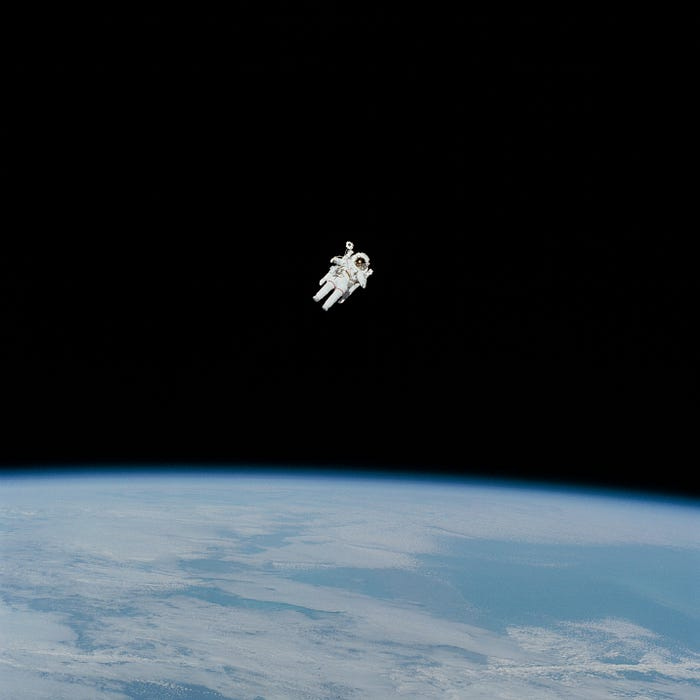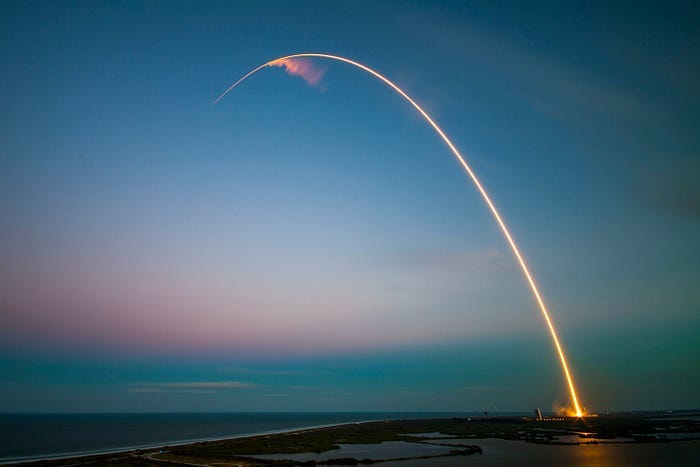If you find this content valuable, please consider subscribing to our newsletter. You’ll receive more insights like this directly in your inbox.
Imagine you’re an astronaut, returning home after a long, cold, and lonely voyage in outer space. As your spaceship approaches tiny Earth from nearly 4 billion miles away, you train your camera on that faint, blue speck floating in a sunbeam against the vast backdrop of space. Click goes the camera, capturing one last image before coming home.
Voyager 1’s Pale Blue Dot, no larger than a pixel in your photo, is home. Everything and everyone you’ve ever known or loved is on that pale blue dot, barely visible in the void.
Arguably one of the greatest given by a man:
Look again at that dot. That’s here. That’s home. That’s us. On it everyone you love, everyone you know, everyone you ever heard of, every human being who ever was, lived out their lives. The aggregate of our joy and suffering, thousands of confident religions, ideologies, and economic doctrines, every hunter and forager, every hero and coward, every creator and destroyer of civilization, every king and peasant, every young couple in love, every mother and father, hopeful child, inventor and explorer, every teacher of morals, every corrupt politician, every “superstar,” every “supreme leader,” every saint and sinner in the history of our species lived there — on a mote of dust suspended in a sunbeam.
When astronomer Carl Sagan first saw that image taken by the Voyager 1 spacecraft, it moved him deeply. As Sagan later wrote and spoke in his famous “Pale Blue Dot” speech, this distant picture of Earth evokes a profound shift in perspective.
Our Tiny World
From far away, Earth appears as a lonely, fragile dot in the endless ocean of space. Borders vanish from sight. Our man-made troubles fade away. “Earth is a very small stage in a vast cosmic arena,”
Sagan remarked.
All of human history, our greatest triumphs and darkest chapters, have played out on a mere speck orbiting an ordinary star amidst 200 billion stars in our Galaxy, itself one among hundreds of billions of galaxies.
How silly and fleeting our dramas seem from a cosmic perspective! As Sagan wrote,
“Our posturings, our imagined self-importance, the delusion that we have some privileged position in the Universe, are challenged by this point of pale light.”
We may feel big and powerful down here on Earth’s surface. But the Pale Blue Dot reminds us of our humbler place in the grand scheme.
Astronauts get this life-changing feeling of perspective shift every time they gaze down at Earth from low orbit or deep space. That’s why I believe every world leader should experience the “Overview Effect” at least once from the window of a spacecraft.
More on that notion below! Back to Sagan’s humble Dot…
The Only Home We’ve Got
We may wish to escape gravity for the endless frontier of space. But cold, airless space cares nothing for us humans. As Sagan warned,
“It has no gifts to offer, no secrets to reveal.” For now and the foreseeable future, little Earth is our only home.
Yet we don’t always treat our Pale Blue Dot with care and respect. Sagan lamented how history-making feats of human ingenuity often served “to burn the lovely planet.” He rightly criticized the ravages of war and weapons. But the Dot also suffers insidious harm from pollution, climate change, and other largely “invisible, creeping, agony” of mistreatment.
“It underscores our responsibility to preserve and cherish the pale blue dot,”
Sagan requested. We owe it to ourselves, future generations, and all Earth’s living beings to do better in our shared home.
Of course, caring for our planet poses complex challenges with no easy fixes. But seeing Earth within the humbling vastness of space can nurture what Sagan called
“a new and savage environmentalism” within us. A protective fury for the exceptional beauty and magic of the Pale Blue Dot against forces that might ravage this “only world known so far to harbor life.”
Glimpsing Earth from a cosmic perspective resets priorities. It awakens us to the preciousness of this little life oasis amid the wilderness of space.
Sagan saw boundless potential within our Pale Blue Dot and its life forms, perhaps even technologically advanced civilizations on distant worlds. To fulfill this cosmic promise, we must first get our own house in order to survive and thrive.
“The Earth is where we make our stand,”
What unites us as fellow inhabitants of this small, fragile outpost far from the nearest roadside inn?
Beyond Borders: A New Perspective
As news headlines constantly remind us, humanity stands divided in so many ways — by race, religion, ethnicity, gender identity, political tribes, and more. Down here on Earth’s surface, it’s easy to feel separated by visible lines on a map or social barriers erected over generations.
But when seen from space, as Sagan wrote,
“the Earth is a small stage in a vast cosmic arena…There is perhaps no better demonstration of the folly of human conceits than this distant image of our tiny world.”
From afar, borders disappear. Social divisions blur, then vanish. Out there in the deep cosmic ocean surrounding our island Earth, pettiness seems trivial when everything we know and love floats vulnerably through the void.
What if we carried this sense of cosmic scale and oneness back with us in our hearts rather than leaving it behind? As more astronauts achieve the Overview Effect through space travel, I hope they spread that contagious perspective shift down here on Earth.
We may first launch rockets to circle Earth or land on the Moon and Mars. But as Sagan envisioned in his speech,
perhaps some day “we will join a great galactic community of intelligent species.”
Exploring space draws humanity together in wonder and pursuit of common purpose. Gazing back at Earth from afar reminds us that we’re all together on this Pale Blue Dot that is our only home for now.
Over to You, Leaders of the World!
Remember I promised more thoughts on why every world leader belongs in orbit at least once? Well, here goes…
Once you’ve glimpsed Earth from space with your eyes, it profoundly changes your worldview. Borders vanish, conflicts seem petty and pointless, and environmental protection feels more urgent. You gain palpable sensation that we’re all in this together on Spaceship Earth.
This Overview Effect strips aside delusions of division and superiority. It awakens authentic empathy, care, cooperation, and responsibility for our shared planet.
That’s why I believe every president, prime minister, monarch, CEO, religious leader, judge, general, cabinet secretary, tribal elder, etc should get mandated field trip to orbit. Call it perspective adjustment through a healthy dose of shock and awe!

Governments invest heavily in monuments, temples, palaces, and other symbols of authority partly to romanticize power. Such edifices cast leaders as giants bestride the Earth.
But seen against the stark enormity of space, our constructs seem like anthills. Up there, leaders realize a king’s gold crown and a peasant’s bare feet point equally down to the same Pale Blue Dot.
Alas, space travel remains expensive, uncomfortable, and risky compared to first class flights. So most VIPs stay grounded despite having the greatest need for cosmic realignment.
But as private space companies slash costs and improve comfort, perhaps weekend leadership retreats in orbit will become affordable and routine!
This is my most meaningful content to date. It will remain pinned as I hope the Pale Blue Dot image helps shift perspectives, as it has done for so many before. I take no credit aside from sharing this view that unites us all. Thank you for your time — please take a moment to gaze upon our tiny, fragile home…








